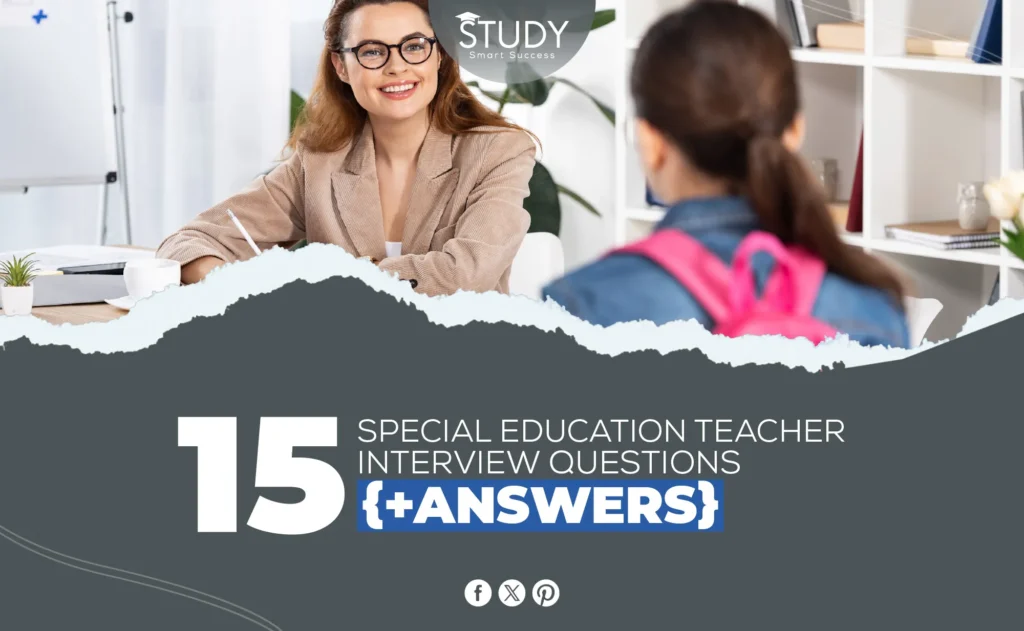Top 15 Special Education Teacher Interview Questions in 2024
Special education teachers help students with learning challenges succeed academically and socially. Special education teacher interviews in 2024 require optimal practices, creative solutions, and inclusive learning settings. This list includes the top 15 special education teacher interview questions for new and seasoned teachers. To help educators serve challenged students, this resource addresses educational approaches and stakeholder collaboration. Read More about Special Education Teacher Resume.
Here are the Top 15 Special Education Teacher Interview Questions.
- What Motivates You to Work in Special Education?
- How Do You Handle Classroom Management Challenges?
- What Is Your Experience with Differentiated Instruction?
- How Do You Approach Individualized Education Plans (IEPs)?
- Can You Explain Your Approach to Inclusive Education?
- How Do You Adapt Curriculum for Diverse Learning Needs?
- What Strategies Do You Employ to Support Students with Behavioral Challenges?
- How Do You Collaborate with Parents and Other Professionals?
- How Would You Support a Student with Autism Spectrum Disorder (ASD)?
- What Techniques Would You Use to Assist a Student with Learning Disabilities?
- How Do You Cater to the Needs of Gifted and Talented Students?
- Describe Your Approach to Creating an Inclusive Classroom Environment.
- How Do You Foster a Positive Learning Atmosphere?
- Can You Provide an Example of a Successful Classroom Intervention?
- How Do You Uphold Special Education Laws and Regulations?
Q1: What Motivates You to Work in Special Education?
Intent
This question is to assess candidate motivation techniques. In response, you may need to explain your motivation.
Imaginary Answer
“The chance to make a difference in kids’ lives with different learning needs drives me to work in special education. I want to create classrooms where all students feel welcome and can do well and reach their full potential.”
Q2: How Do You Handle Classroom Management Challenges?
Intent
The question makes it easier for the questionnaire to know how you can face the problems that arise in the classroom, and in response, you need to show your skills.
Imaginary Answer
“I deal with management challenges in the classroom by being proactive and focusing on making friends, being clear about standards, and always being there for my students. I also use tools like visual schedules, behavior charts, and positive feedback to create a good and organized learning space.”
Q3: What Is Your Experience with Differentiated Instruction?
Intent
The purpose of this question is to determine what methods you use to read to children in the classroom and whether you can meet the needs of all children. In response to this question, you must describe your reading methods, making it easier to understand your professional performance.
Imaginary Answer
“As part of my experience with differentiated teaching, I’ve changed lessons to fit students’ different interests, learning styles, and abilities. To meet the needs of every student in the class, I use different ways to teach, such as tiered tasks, flexible grouping, and scaffolded support.”
Q4: How Do You Approach Individualized Education Plans (IEPs)?
Intent
When interviewers ask about your approach to Individualized Education Plans (IEPs), they want to know how you make and use personalized learning plans for kids with special needs. Focus on showing that you can work with others, figure out what students need and what they are good at, set goals that can be reached, and keep an eye on their progress.
Imaginary Answer
“As part of my approach, I work with parents, teachers, and specialists to determine what each student needs, set attainable goals, choose the proper modifications and accommodations, and keep an eye on their progress to ensure they succeed.”
Q5: Can You Explain Your Approach to Inclusive Education?
Intent
Checking how well the individual understands the ideas behind inclusive education and how they plan to make a classroom where all students, including those with disabilities, feel valued and supported.
Imaginary Answer
“My approach to inclusive education is based on making the classroom a warm and friendly place where all students, no matter their abilities or backgrounds, feel respected and included. I encourage students, teachers, and families to work together, use universal design for learning and differentiated teaching, and create an environment of acceptance and respect.”
Q6: How Do You Adapt Curriculum for Diverse Learning Needs?
Intent
Checking how well the individual can change and adapt lesson plans, teaching methods, and testing methods to meet the unique learning needs of students with disabilities and other special needs.
Imaginary Answer
“I change the lessons based on what each student needs to learn by looking at their skills, weaknesses, and preferred ways of learning. After that, I change the lessons, tests, and ways I teach to fit the needs of each student. I also ensure that all my students can access and interact with the curriculum well by giving them suitable accommodations and support.”
Q7: What Strategies Do You Employ to Support Students with Behavioral Challenges?
Intent
Finding out how the candidate handles behavior problems in the classroom, such as methods for managing behavior, using positive reinforcement, and resolving conflicts.
Imaginary Answer
“I use a mix of proactive and reactive tactics to help students who are having behavior problems. I set clear goals, use positive behavior interventions, and ensure consistent routines and structure. In response, I use de-escalation, redirection, and positive reinforcement methods. When necessary, I work with families and support staff to create individualized behavior plans.”
Q8: How Do You Collaborate with Parents and Other Professionals?
Intent
Test the applicant’s capacity to work together and speak clearly with parents, guardians, and other professionals (like therapists and counselors) to help students with special needs grow and be healthy.
Imaginary Answer
“I work with parents and other professionals by keeping lines of communication open, constantly listening to their ideas and concerns, and including them in making decisions about their child’s education. I also set up regular meetings to discuss students’ success, share strategies, and plan interventions. This way of working together ensures the kid has the same support system at home and school.”
Q9: How Would You Support a Student with Autism Spectrum Disorder (ASD)?
Intent
Checking how much the candidate knows about interventions and methods that have been shown to work to help students with autism spectrum disorder, such as ways to improve communication, social skills, and sensory integration.
Imaginary Answer
“Before supporting an ASD student, I would analyze their strengths, weaknesses, and sensory preferences. I would tailor visual timetables, social stories, and sensory supports to help them intellectually and socially. To foster a helpful learning environment, I would provide routines, social skills, and parent-specialist teamwork.”
Q10: What Techniques Would You Use to Assist a Student with Learning Disabilities?
Intent
Checking how well the candidate knows how to use teaching methods, accommodations, and assistive technology to help students with learning disabilities access the material and do well in school.
Imaginary Answer
“I would use proven approaches to help a learning-disabled student. It could involve teaching with several senses, explicitly outlining techniques, dividing work into manageable steps, giving frequent feedback and appreciation, and providing knowledge in varied forms. I would work with other teachers and professionals to develop and implement student learning interventions.”
Q11: How Do You Cater to the Needs of Gifted and Talented Students?
Intent
Find out how the candidate plans to meet the specific needs of gifted and talented students in a special education setting by offering extra activities, differentiating lessons, and personalized learning experiences.
Imaginary Answer
“Extracurricular activities are available for gifted and talented kids. Examples: independent study, advanced reading, competitions, and specialized programs. Complex tasks, critical thinking, creativity, teamwork, and peer mentoring distinguish my lectures. With parents and specialists, I construct hobby- and talent-based education programs for students.”
Q12: Describe Your Approach to Creating an Inclusive Classroom Environment.
Intent
Looking at the candidate’s plans for promoting diversity, fairness, and inclusion in the classroom, such as ways to help all students feel like they fit, are respected, and are accepted.
Imaginary Answer
“Respecting, accepting, and respecting diversity makes my classroom inclusive. I set conduct and respect expectations for pupils. I integrate varied opinions and experiences in classes and discussions to make students feel included. I also advocate collaboration, accommodation, and fighting prejudice and discrimination. I aim to make the classroom safe, accepting, and educational for everybody.”
Q13: How Do You Foster a Positive Learning Atmosphere?
Intent
Checking how the candidate plans to make the classroom a safe, fun, and caring place where students feel supported, encouraged, and given the tools they need to do well in school and social situations.
Imaginary Answer
“In my entertaining, supportive classroom, kids feel appreciated, respected, and inspired to succeed. I set clear conduct and education standards, praise and encourage, and model good behavior. I encourage students to interact, participate, and take responsibility for their learning and settle problems constructively. I try hard to make my kids friends, build trust, and inspire learning.”
Q14: Can You Provide an Example of a Successful Classroom Intervention?
Intent
Asking the candidate to describe a time when they effectively intervened or provided help to meet a student’s learning or behavior needs, showing that they can solve problems and have real-world experience.
Imaginary Answer
“Certainly! A classroom intervention helped a struggling student focus. Observing the student and talking to the school psychologist helped me plan an intervention. Students are given fidget items to focus on, work is broken up, and a visible timer is used. Students increased confidence and success in class by improving focus, productivity, and academic achievement.”
Q15: How Do You Uphold Special Education Laws and Regulations?
Intent
Checking how much the candidate knows about special education laws, rules, and morals, as well as how committed they are to following them and standing up for the rights and needs of disabled students.
Imaginary Answer
“I comply with special education regulations by following federal, state, and local legislation, including IDEA and Section 504. I maintain accurate student evaluations, create and implement IEPs, and provide necessary adjustments and support. I represent disabled students and address legal and procedural issues with administrators, coworkers, and support staff.”
Conclusion
Finally, a special education teacher interview involves knowledge of diverse learning needs, effective instruction, and inclusive and supportive learning environments. This guide’s top 15 special education teacher interview questions can demonstrate teachers’ experience, love, and dedication to challenging students. Special education teachers assist every kid to flourish academically, socially, and emotionally through teamwork, sensitivity, and professional growth. May aspiring and seasoned educators answer interview questions with confidence, sincerity, and a desire to serve all pupils.


